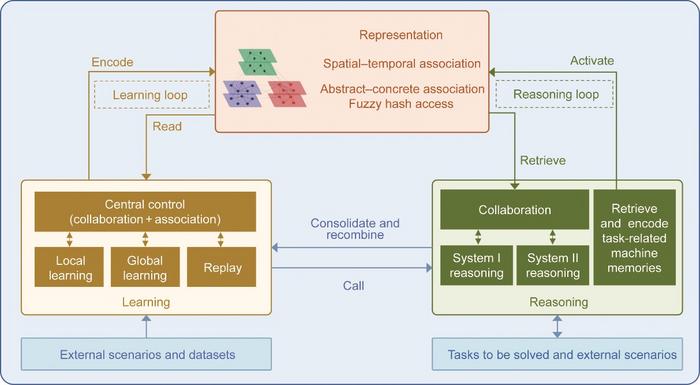In a groundbreaking study published in the journal Engineering, researchers tackle the pressing limitations of existing AI systems by revisiting the memory mechanisms of the human brain. The research, titled “Machine Memory Intelligence: Inspired by Human Memory Mechanisms,” presents a multi-faceted approach that seeks to bridge the gap between biological intelligence and artificial intelligence. By exploring cognitive functions that humans naturally exhibit, the study aims to build a framework that can significantly enhance the efficiency and effectiveness of AI models.
The advent of large language models, such as ChatGPT, has revolutionized numerous fields, yet they come with substantial shortcomings. For instance, these models often require vast amounts of data and computing power, leading to environmental and resource concerns. Additionally, they tend to suffer from phenomena such as catastrophic forgetting, whereby previously learned information is lost when new data is introduced. This incapacity to retain information autonomously highlights a major characteristic of AI that mirrors constraints noted in human cognitive functioning.
The research introduces the concept of “machine memory,” which aims at mimicking the intricate storage systems found within the human brain. Unlike traditional models that approach data processing in simplistic and linear manners, machine memory employs a dynamic, multi-layered framework capable of encoding external stimuli into machine-readable formats. Such an architecture would allow for real-time updates and the formation of unique spatiotemporal associations, thus emulating the fluidity of human memory more effectively.
One of the pivotal innovations is the M²I framework, comprising representation, learning, and reasoning modules. This design features two interactive loops that engage these elements in a synchronized fashion, advocating for a more holistic form of learning and reasoning. By uniting various cognitive aspects into a consolidated framework, the researchers aim to facilitate a more comprehensive understanding of knowledge application, making machines potentially more adaptable and resource-efficient.
The M²I framework opens the door for expansive research in four crucial domains. First, it delves into neural mechanisms that underpin machine memory, laying the groundwork for understanding how artificial systems might replicate human pre-configurations in neural networks. The paper underscores that comprehending these biological substrates will be crucial for mimicking the brain’s extraordinary processing capabilities.
Next, it seeks to achieve sophisticated associative representations within machine memory. Just like humans can form connections between abstract concepts and concrete experiences, AI models must develop similar abilities. This scientific exploration attempts to refine the processes of information encoding and retrieval, ensuring that AI systems can mobilize knowledge as effectively as humans do in varied contexts.
The third focus area addresses the vital challenge of continual learning under low-energy conditions. Catastrophic forgetting presents a significant barrier to the evolution of AI, as many systems presently require massive resources to learn new concepts without discarding existing data. By integrating memory mechanisms inspired by the human brain, the paper suggests a pathway toward promoting resilience in learning processes, allowing machines to adapt to new information seamlessly.
Finally, the research aims to harness the dual-system cooperation inherent in human reasoning—where intuition and logic operate in concert. This goal is not only ambitious but essential for the development of AI systems that can address complex, real-world problems. By fostering both rational and intuitive reasoning capabilities, the M²I framework promises to enhance the interpretability and efficiency of AI applications across different domains.
Throughout the study, significant progress and key challenges within each research area are thoroughly reviewed. The authors reference experimental findings that illustrate how the human brain develops and evolves its memory capabilities, laying out a roadmap for potential implementations in AI. This form of rigorous analysis provides a robust framework for future explorations, ultimately leading to more informed and impactful research trajectories.
Looking forward, the implications of the M²I framework extend far beyond academia into various sectors reliant on AI technologies. From healthcare to finance, the necessity for more intelligent, adaptive machines is critical as industries grapple with increasing demands for efficiency and precision. The ability of AI to learn from and retain information based on lived experiences could revolutionize customer service, predictive analytics, and personalized medicine.
While the potential for innovation is vast, researchers caution that achieving these advancements will necessitate dedication and collaboration within the scientific community. As explorations into machine memory progress, the ultimate goal remains the development of intelligent systems that can not only process data but understand and learn from it as humans do. This revolutionary approach to AI development could pave the way for inventions previously thought to be the realm of science fiction.
The paper serves as a catalyst for further exploration in the mechanics of AI learning and reasoning, providing a conceptual framework for researchers and practitioners alike. Its implications may spur additional inquiries into the foundational aspects of intelligence, both artificial and organic, leading to a deeper understanding of cognition itself.
In conclusion, the ongoing exploration of machine memory intelligence based on human memory mechanics hints at a paradigm shift in artificial intelligence development. This pioneering research offers fresh insights that challenge current paradigms by suggesting innovative methodologies to address recognized limitations. With time, dedication, and interdisciplinary collaboration, these concepts may not only redefine AI capabilities but also the relationship between humanity and technology.
Subject of Research:
Article Title: Machine Memory Intelligence: Inspired by Human Memory Mechanisms
News Publication Date: 28-Jan-2025
Web References: Link to the paper
References:
Image Credits: Qinghua Zheng et al.
Keywords
Tags: advancements in AI cognitive capabilitiesbridging biological and artificial intelligencecatastrophic forgetting in AIdynamic data processing in AIenhancing AI efficiency through memory mechanismsenvironmental concerns of AI modelsframeworks for improved AI memory retentionhuman cognitive functions in artificial intelligenceinnovative approaches to memory in artificial intelligencelimitations of large language modelsmachine memory intelligence researchneuroscience-inspired AI memory systems





